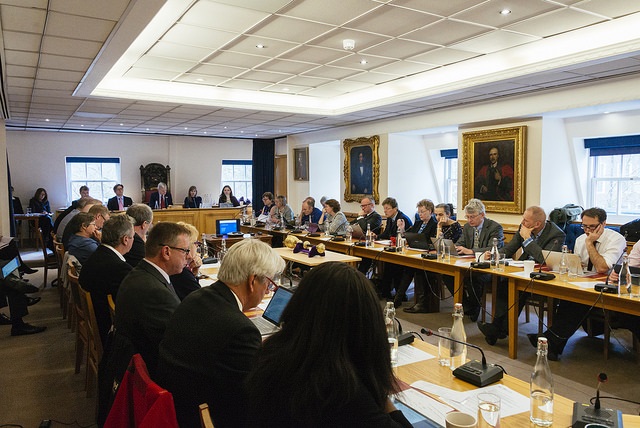RCVS introduces two new committees
19 June 2018
We have introduced two new committees and will increase the frequency of public RCVS Council meetings from this year’s Royal College Day (13 July 2018) to aid our decision-making processes.
 Following the passage through the Houses of Parliament in May of a Legislative Reform Order (LRO) that updated the College’s governance, members of RCVS Council were presented with a paper on further changes to the committee structure at the RCVS Council meeting on Thursday 14 June 2018.
Following the passage through the Houses of Parliament in May of a Legislative Reform Order (LRO) that updated the College’s governance, members of RCVS Council were presented with a paper on further changes to the committee structure at the RCVS Council meeting on Thursday 14 June 2018.
Among the changes accepted by Council members was an increase in the frequency of public RCVS Council meetings to six in the 2018-19 Presidential year and to eight in the following Presidential year.
The LRO also called for a review of the current Operational Board, which oversees the management of College business and comprises the RCVS Officer Team, committee chairs and senior staff. It was decided that, in light of the more frequent Council meetings, the Operational Board would cease to meet from the summer of 2019.
Some of the work of the Operational Board will be transferred to a new Finance and Resources Committee which will be introduced from summer 2019 and will have within its remit budgets, IT, data issues, human resources, the College estate and strategic communication issues.
From this summer we will also introduce a new Advancement of the Professions Committee, which will be responsible for coordinating and feeding into projects and activities that fall under the College’s Royal Charter pledge of advancing veterinary standards. Projects falling under its remit will include the Mind Matters Initiative, the RCVS Fellowship, the ViVet innovation project, RCVS Leadership, VN Futures and Vet Futures.
Lizzie Lockett, our Chief Executive Officer, said: “By approving this new direction of travel Council has paved the way for a more flexible and agile governance structure, better able to react to events and make strategic decisions in a more open and transparent way.
“The Advancement of the Professions Committee is a particularly exciting development, as the last few years have seen an increase in the number of special projects and initiatives, and having one body that oversees them will encourage a joined-up approach and give Council members greater input in how we take them forward.
“In light of the smaller Council, there was also discussion about how to widen the pool of experience and expertise available to our committees by co-opting individuals from the professions at large. Such opportunities will be identified once the skills matrix of our existing Council members has been analysed.”
The full details about the new Council and Committee structure can be found in the papers for the June meeting of Council.